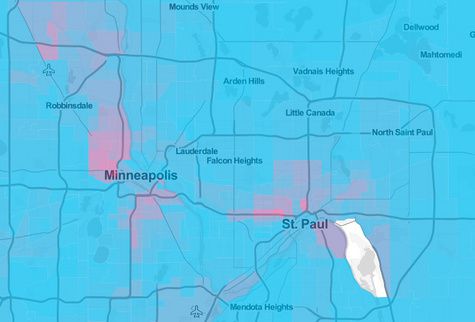 The black-white racial segregation of Minneapolis-St. Paul metro area, via the Urban Institute. Blue = higher concentration of whites, red = higher concentration of blacks.
The black-white racial segregation of Minneapolis-St. Paul metro area, via the Urban Institute. Blue = higher concentration of whites, red = higher concentration of blacks.
New research suggests that segregation — by both race and skill set — drags down economic growth of entire metropolitan areas. Notice I said entire areas.
Segregation doesn’t just affect the poor core of a city, the study says, it hurts wealthy families in the suburbs as well.
Harrison Campbell, an associate professor of geography at UNC-Charlotte and one of the studies authors, told Emily Badger of theatlanticcities.com:
“The argument that we’re trying to make here is that there is reason for everybody in metropolitan areas to be concerned about skills, about education, about housing, about segregation, about integration.”
Nationwide, segregation has been on the decline since the 1970s. But the new research suggests that its impact on metropolitan areas has gotten worse.
There’s myriad reasons why, including jobs being geographically distant from segregated communities. Badger writes:
Metropolitan economies rely on labor of all kinds, often side-by-side, with high-end architects alongside plumbers, office towers near cab stands, and biotech inventors with security guards. But when low-wage workers pay an out-sized chunk of their paycheck just getting to work, or when suburban office parks locate beyond the reach of public transit, those inefficient patterns start to affect whole regional economies.
And most interestingly, Badger writes that skill and racial segregation prevents innovations that might occur when people who are not alike interact with each other.
So what’s to be done? The study calls for affirmative-action style transportation policies for low-resource communities. That wouldn’t necessarily change the underlying segregation, Badger writes, but it could increase access to opportunity.
